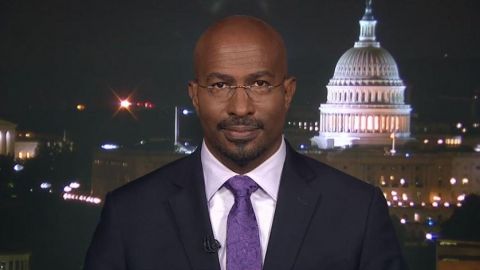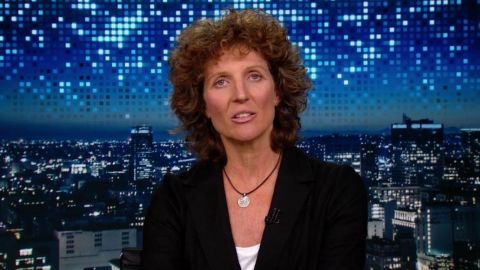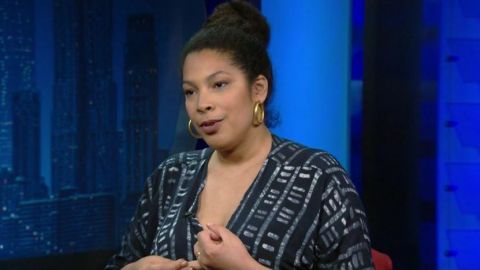Read Transcript EXPAND
CHRISTIANE AMANPOUR: And we now delve into that issue from the perspective of a Pulitzer Prize-winning playwright, Jackie Sibblies Drury. Her drama “Fairview” confronts many different types of racism and it centers around the dinner party with an African-American family. Alicia Menendez spoke about to Drury about how her play forces the audience to think about their own racial views.
(BEGIN VIDEO TAPE)
ALICIA MENENDEZ: Jackie, thank you so much for being here with us.
JACKIE SIBBLIES DRURY, PULITZER PRIZE-WINNING PLAYWRIGHT: Thank you for having me.
MENENDEZ: I saw “Fairview” last night.
DRURY: Thank you so much for coming.
MENENDEZ: Hard question. How would you describe this play? >> DRURY: I guess in a slightly sly way, it is either is a play that centered around a family drama, of like — or family dramedy, of like a black upper- middle-class family who is preparing for a special event, which is this birthday party for the matriarch of the family. And all this sort of — I guess, yes, what gets in the way of that attempted celebration.
MENENDEZ: Let’s look at a clip from the play.
(BEGIN VIDEO CLIP)
BEVERLY: I am going to see mama here.
DAYTON: At the head of the table?
BEVERLY: It’s her birthday.
DAYTON: It’s my house.
BEVERLY: Our house. So mama, me, Keisha, Tyrone, you, and Jasmine.
DAYTON: You didn’t tell me Jasmine is coming.
BEVERLY: Didn’t I? Of course, Jasmine’s coming. She’s my sister.
DAYTON: I thought you wanted this dinner to go well?
BEVERLY: Dayton, please.
DAYTON: That one man knows everything about everybody and she doesn’t have one good thing to say about anybody. She’s going about FBI, NSA, AGP.
BEVERLY: She’s family and family is everything.
DAYTON: Everything. I know. Shut up, Dayton. Get the silk.
BEVERLY: Thank you, Dayton. You’re a big help. And bring the real vegetables you want.
(END VIDEO CLIP)
MENENDEZ: What is this first act supposed to prepare us for?
DRURY: Yes. So it’s supposed to prepare you to sit and watch a play. So that was a name that sounds obvious, but the director Sarah Benson and the set designer Mimi Lien and I talked about it a lot, about having the audience come in and feel as though they’re going to watch a three-act play where like Hijinx and Sue and there are secrets about the family, and that there’s going to be laughs and tears.
MENENDEZ: And just when you have lulled us into believing that that is actually the play that we’ve come to see, there is almost like a record shift.
DRURY: Yes. Yes. And we were excited about like sort of first presenting something that felt fully filled out. And then, like, radically changed the audience’s perception of what’s happening and of who is watching these characters. And the second act of the play, it’s a repeat of the first act, technically, but without any sound. And so it sort of becomes this like 25-minute long theater dance. And while that’s happening you hear a conversation between what I think people assume to be a group of white people because they talk about race in a really careless way, in a way that most good, liberal white people wouldn’t do if there was a person of color present in the room. And so they have a problematic conversation that we overhear.
MENENDEZ: You said something that I want to pick up on, which is that the voiceover is presumed to be white people talking about race, but not just any white people, liberal white people. Why is that detail important?
DRURY: I think because there’s something about the way we talk about racism right now where, where especially because the country is so divided, that it seems like racism comes from somewhere else. And that it’s a problem for Republicans, it’s a problem for people from the south, it’s a problem for a flyover country. And we as good liberals in New York or in the East Coast generally seem to think that racism has been solved here when it hasn’t. And that, like, a lot of people think that because their politics are good or because they voted for Obama or because they have friends of color or because they consume culture made by people of color, that means they have no bias and that they — because they’re consumers of culture are experts in other races and other racial experiences. And so the play is trying to speak to those people and sort of talk about white privilege in a way that is hopefully not like shutting them down or like telling them off, necessarily, but is sort of like pointing out how being the primary audience for all the culture that’s created puts you in this position of extreme power and extreme control, and that like everything becomes centered around you.
MENENDEZ: There was several lines of dialogue in that second act that I was particularly compelled by, which is you’re watching a black family on stage but the first discussion of race begins with talking about Asians.
DRURY: Yes.
MENENDEZ: And then transitions to talking about Latinos.
DRURY: Yes.
MENENDEZ: And it’s sort of a reminder, as you’re experiencing this, that this is not happening simply in a black-white paradigm.
DRURY: Yes.
MENENDEZ: You take us out of that immediately.
DRURY: Yes. Thank you for noticing that. We thought a lot about that because there is so much about — as a Latino person yourself, you’re aware of the black-white conversation that is basically racism. People think of a black-white paradigm. But that — I think, and maybe it’s because I’m an immigrant myself even though I’m a black person, that there are so many other ways that racism works in this country. And the sort of — I do feel like this original sin of slavery and Jim Crow has sort of, like, infected the ways that other races are treated here. Because there is always this white and this other. And that was really important to us to sort of talk about how even the concept of having minorities is something that is very American and is like sort of uniting people who don’t necessarily have a lot of cultural or racial things in common, but by nature of the fact that whiteness is supreme in America, it makes everyone else sort of in this shunted-off pile.
MENENDEZ: Talk to me about Keisha because that character plays a pivotal role in the play. In fact, let’s watch a clip.
(BEGIN VIDEO CLIP)
KEISHA: Will you please talk to my mama about me taking a year off before college?
JASMINE: Oh, Keisha.
KEISHA: Please, Aunt Jasmine, that is so important to me.
JASMINE: I know. I know.
KEISHA: Every year, three varsity sports, debate, yearbook.
JASMINE: You’re very accomplished.
KEISHA: And I’m exhausted. Don’t get me wrong, I can’t wait for college, but I’m so exhausted. I need some time away so that I might replenish myself.
JASMINE: That’s very well-articulated, Keisha.
KEISHA: I know, but she doesn’t listen to me.
JASMINE: But your mama doesn’t listen to me, either.
KEISHA: Will you please, say it to the least, mention that a gap year is a good idea? Please?
JASMINE: All right, Keisha. All right.
(END VIDEO CLIP)
MENENDEZ: She’ll go on to play a very different role, but what is the function of that character?
DRURY: So she starts off as this sort of like typical teenage character. And in a lot of plays you have like either an (INAUDIBLE), which is like a beautiful young woman who doesn’t know very much, who expresses hope and like you’re able to project optimism on to her. Or you have a child who is naive but is able to see things that society cannot see. And so she sort of is a combination of those two things where she is hopeful about her future and excited about growing up, and then sort of starts to realize that there are things being projected on to her that she is not in control of. And she’s sort of the one character in the play that’s able to see through the conventions that we’ve set up.
MENENDEZ: And is that supposed to be generational commentary?
DRURY: Yes, I think so. I definitely think that there are things that you get used to as you get older so you’re just like unable to see the world that you’ve created around yourself because you’ve been in it too long to be able to recognize inequities or things that don’t have to be that way.
MENENDEZ: There’s also a false promise in my generation of which were on the older (INAUDIBLE) generation but because it is the largest most diverse generation in American history, there was this idea that somehow we would all figure out race.
DRURY: Yes. That’s so much pressure. Like how? Why? How are you supposed to have done that?
MENENDEZ: First act seems like just settling in for a nice three-act play, a family dramedy. Second act, you’re reliving the first act with a voiceover and commentary. Third act, you have all of these people rushing on stage. Then you break that fourth wall. For someone who is not a theater person, what is the fourth wall?
DRURY: The fourth wall is basically just the imaginary edge of the theater. When there are two people talking on stage — if you and I are talking and there’s an audience here, you and I will speak and we’ll pretend that the audience isn’t there, we’re having it into that conversation even though there’s hundreds of people in the audience of the theatre or I guess there’s a hundred of people through the camera.
MENENDEZ: Right. I mean don’t look at them.
DRURY: But by breaking the fourth wall, it’s just acknowledging that there is an audience, that there are people watching what has been happening.
MENENDEZ: Right. And you break the wall in a profound way because you offer the audience a choice. How the play ends really have a lot to do with the choice that the audience makes.
DRURY: Yes, which is exciting. It gives the audience a reason to be there, I think.
MENENDEZ: Talk to me about that decision because that is a break with convention.
DRURY: Yes. Yes. I think that it was thinking about a way to allow the white members of the audience to make space for people of color. And especially there is a lot of casual racism that happens in the play, there is a lot of over racism that happens in the play, there are a lot of stereotypes directed at people of color. And that can feel icky and toxic and familiar to some people. Familiar in terms of things that they’ve said but also in terms of things that they’ve heard and not realize was hurtful to people or knew was hurtful to people but didn’t want to make someone else feel uncomfortable by pointing out that they were saying something that was casually racist And so we wanted to have white members of the audience able to do something to actually physically embody this idea of making space that like us older millennials have been talking about since our teens, since our 20s. It felt like a positive, good thing to be able to do.
MENENDEZ: The staging of the show that I saw was done in Brooklyn.
DRURY: Oh, yes.
MENENDEZ: One might guess it was a largely liberal audience.
DRURY: Yes.
MENENDEZ: What’s the response that you get night after night?
DRURY: It’s always a little bit different. It always is. Like some people feel really offended and hurt the at being categorized in a way that they don’t categorize themselves. Some people feel like a sort of catharsis at the end of the show. Some audience members cry. Some audience members sort of storm off and are really uncomfortable and angry. It’s just like — there’s something — I mean that’s part of why I love theater, that sort of one event is able to splinter off into so many different experiences that you’re able to see and participate in at the same time which you like can’t really do in any other art form.
MENENDEZ: Unpack for me something you said which is that there are people who get uncomfortable being categorized in a way that they don’t categorize themselves.
DRURY: Yes. I feel like there’s — some of the responses that I’ve heard from white people are that “I don’t think of myself as white” or “I’m not white because I’m gay” or “I’m not white because I’m queer” or “I’m not white because I’m physically disabled.” And there’s — or “I’m not white because I’m not racist.” And like all of those thoughts are privileged thoughts to be able to have. And there are a million different kinds of privilege. I have gender privilege. I have white skin privilege. I’m like aware that — middle-class privilege, that there are different considerations but just even acknowledging whiteness as a privilege is really hard for some people because they feel victimized by other aspects of their identity. And so I understand why some people choose not to move. And I think that that shows up in our society as well as at the end of the show and so there’s something that’s interesting to me about that.
MENENDEZ: Zone in for me on the person who gets offended because they’re white, they identify as white but because they are not racist, they feel that you have somehow bucketed them in with another cohort.
DRURY: Exactly, yes. And that is a frustrating feeling which I totally understand. But it’s part of the point of the play where both as a person who benefits from white privilege, you benefit from this historical system of white supremacy and that’s not your fault. But you also by not doing anything about it, you’re perpetuating it. And by not acknowledging it, you’re also impacting other people’s lives around you every day by just like living your life. And that’s a horrid thing for — it sounds like blame but it’s just acknowledgment, I think.
MENENDEZ: What do you say to the person who watched it and feels attacked at the end?
DRURY: I think I say that that’s interesting.
MENENDEZ: You won the Pulitzer Prize for “Fairview”.
DRURY: I did.
MENENDEZ: Do you have to wake up and remind yourself of that sometimes?
DRURY: I don’t, right. I try not to. I think it’s weird to have won a prestigious prize like that and still be working on the play. Like if we’re doing rehearsals, we would be like making changes. And like Roslyn Broff, who plays Joslyn made a joke about, are you sure you want to cut something because this is a Pulitzer Winning Prize play now? But yes, I mean it’s an honor. I just don’t really know where to put it in my brain.
MENENDEZ: Jackie, thank you so much.
DRURY: Thank you so much, Alicia. This has been a pleasure.
About This Episode EXPAND
Christiane Amanpour speaks with Barbara Boxer and Van Jones about the democratic presidential debates. Michelle Akers joins the program to discuss the challenges and prejudices female soccer players are forced to overcome. Alicia Menendez speaks with Jackie Sibblies Drury about her Pulitzer prize-winning play, “Fairview.”
LEARN MORE


